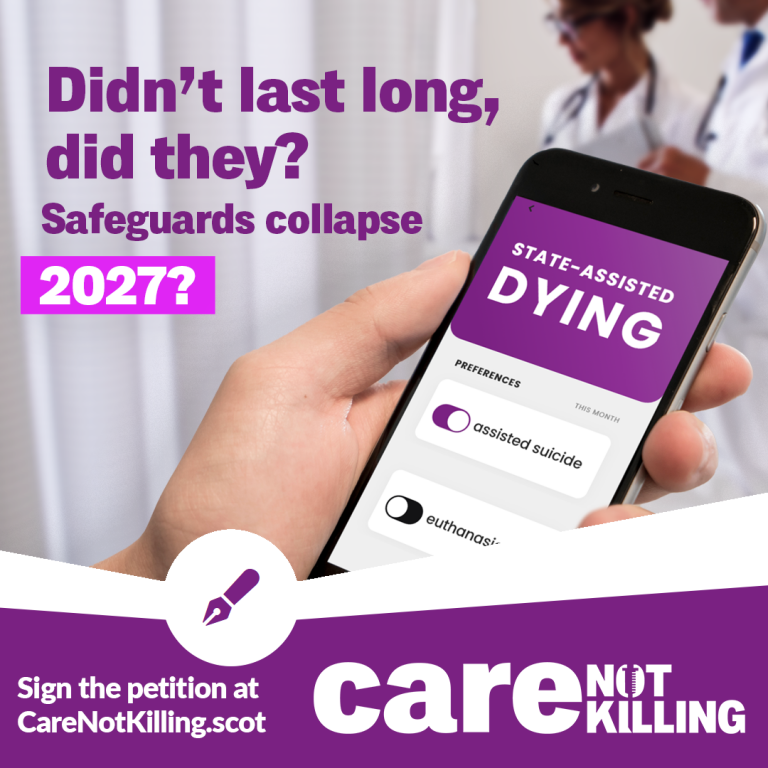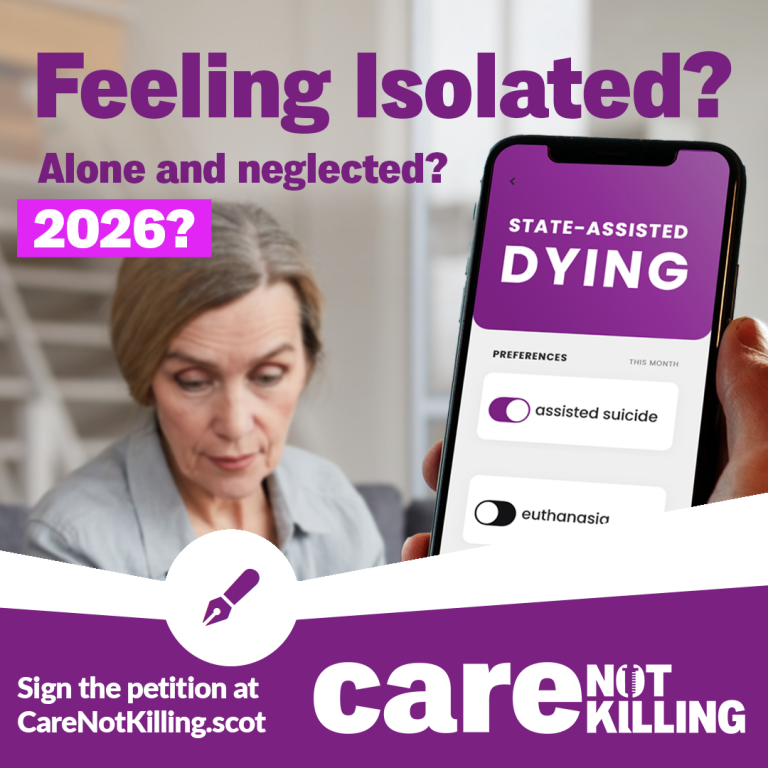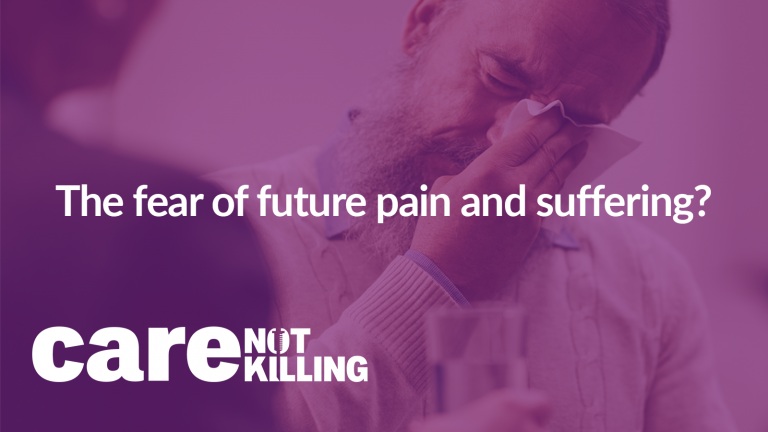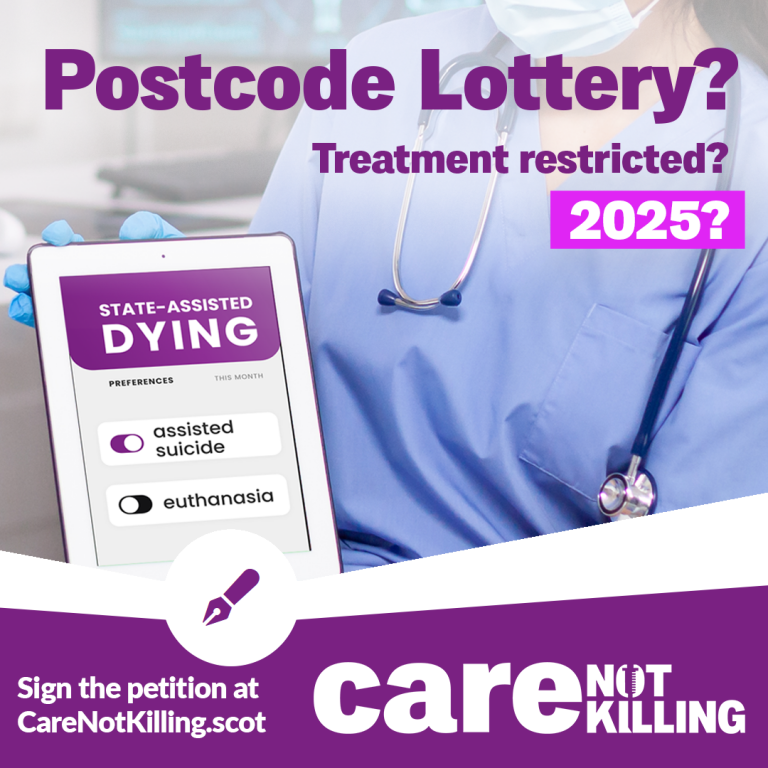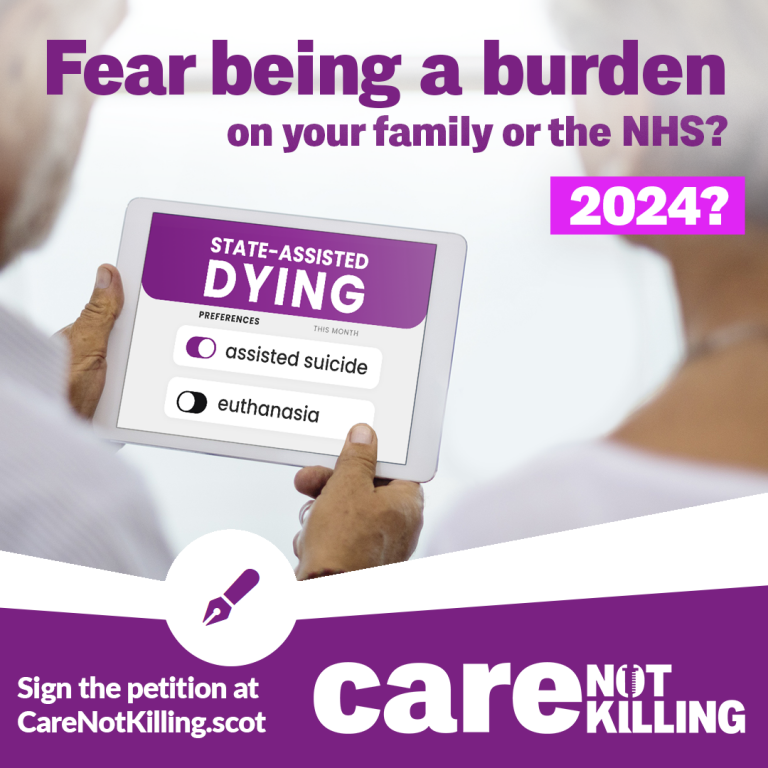2027 - Safeguards Collapse?
Canada shows courts overrule safeguards & extend euthanasi Canada shows courts overrule safeguards & extend euthanasia to others despite politicians’ best intentions. There is no safe way to legalise ‘state-assisted dying.’ The slippery slope is real
There is no safe way to legalise ‘state-assisted dying’ (assisted suicide and euthanasia) in Scotland. The slippery slope is real…and dangerous.
A big deal is always made about ‘safeguards but even if the original ‘safeguards’ are well intentioned, the protection they provide is temporary and illusory. The way that ‘safeguards’ get expanded and extended is easy to predict because it has already happened abroad; from people who are terminally ill to include people who are not terminally ill; from people who are mentally competent to include people who are not mentally competent; from adults to include children.
Whenever politicians are considering the experience of other countries, there are three key questions they have to consider. What were the ‘safeguards’ when the law was first introduced? Which of these ‘safeguards’ have now been dropped? What is being lobbied for or considered next? When politicians do that, they begin to realise that the only way to prevent assisted suicide and euthanasia from being incrementally extended to include other categories of people or medical conditions is to not introduce it in the first place.
But are the ‘safeguards’ being proposed for Scotland well intentioned? Or are they merely the lowest common denominator that the euthanasia lobby think they can get passed by a new generation of parliamentarians? There have been at least ten attempts to legislate on this issue in the British Isles in the last twenty years. All of them have been defeated because when politicians consider the issues in depth they come to the conclusion that it is simply not safe. It is not possible to design a system where there are adequate ‘safeguards’ to ensure that people who are vulnerable, people who are disabled or people who are elderly, will not feel under pressure, either from external sources or more likely internally, to end their lives prematurely.
The fact is that the various campaign groups lobbying to change the law all have different aims and agendas, often based on the autonomy of the individual. Yet the autonomy argument can be widely applied and it is difficult to draw arbitrary lines where the boundary of the law will be. At least one UK group is already arguing for euthanasia for patients with non-terminal illnesses, but if the principle behind legalising state-assisted suicide and euthanasia is the autonomy of the individual, why draw the line there? Once the law is changed, the lobby groups can each resume their original goals and the evidence from other countries shows that the categories of eligible people and conditions can be rapidly expanded.
If ‘state-assisted dying’ (assisted suicide or euthanasia) were to become legal in Scotland, how would you prevent it being extended to other categories of people or other medical conditions?,
A big deal is always made about ‘safeguards but even if the original ‘safeguards’ are well intentioned, the protection they provide is temporary and illusory. The way that ‘safeguards’ get expanded and extended is easy to predict because it has already happened abroad; from people who are terminally ill to include people who are not terminally ill; from people who are mentally competent to include people who are not mentally competent; from adults to include children.
If you’re considering the experience of other countries, there are three key questions every politicians has to consider. What were the ‘safeguards’ when the law was first introduced? Which of these ‘safeguards’ have now been dropped? What is being lobbied for or considered next? It’s when you ask those questions, you begin to realise that the only way to prevent assisted suicide and euthanasia from being incrementally extended to other categories of people or medical conditions is to not introduce it in the first place.
Another point to consider is if the ‘safeguards’ being proposed for Scotland are well intentioned? Or are they merely the lowest common denominator that the euthanasia lobby think they can get passed by a new generation of parliamentarians? There have been at least ten attempts to legislate on this issue in the British Isles in the last twenty years. All of them have been defeated because when politicians consider the issues in depth they come to the conclusion that it is simply not safe. It is not possible to design a system where there are adequate ‘safeguards’ to ensure that people who are vulnerable, people who are disabled or people who are elderly, will not feel under pressure, either from external sources or more likely internally, to end their lives prematurely.
The fact is that the various campaign groups lobbying to change the law all have different aims and agendas, often based on the autonomy of the individual. Yet the autonomy argument can be widely applied and it is difficult to draw arbitrary lines where the boundary of the law will be. One UK group is already arguing for euthanasia for patients with non-terminal disease, and if the principle behind legalising State-assisted suicide and euthanasia is the autonomy of the individual, why draw the line there? Once the law is changed, they can each resume lobbying again for their original goals and the evidence from other countries shows that the categories of eligible people can be rapidly expanded.
There is no safe way to legalise ‘state-assisted dying’ in Scotland. The slippery slope is real…and it is dangerous.
Other ways to share this campaign resource:

